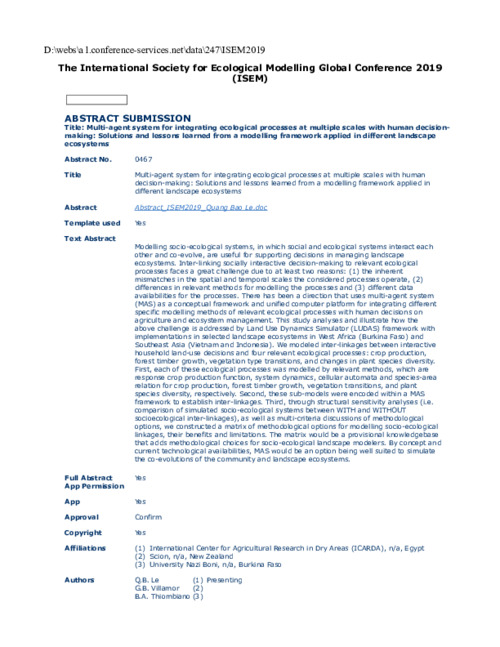Multi-agent system for integrating ecological processes at multiple scales with human decision-making: Solutions and lessons learned from a modelling framework applied in different landscape ecosystems
Abstract
Modelling socio-ecological systems, in which social and ecological systems interact each other and co-evolve, are useful for supporting decisions in managing landscape ecosystems. Inter-linking socially interactive decision-making to relevant ecological processes faces a great challenge due to at least two reasons: (1) the inherent mismatches in the spatial and temporal scales the considered processes operate, (2) differences in relevant methods for modelling the processes and (3) different data availabilities for the processes. There has been a direction that uses multi-agent system (MAS) as a conceptual framework and unified computer platform for integrating different specific modelling methods of relevant ecological processes with human decisions on agriculture and ecosystem management. This study analyses and illustrate how the above challenge is addressed by Land Use Dynamics Simulator (LUDAS) framework with implementations in selected landscape ecosystems in West Africa (Burkina Faso) and Southeast Asia (Vietnam and Indonesia). We modeled inter-linkages between interactive household land-use decisions and four relevant ecological processes: crop production, forest timber growth, vegetation type transitions, and changes in plant species diversity. First, each of these ecological processes was modelled by relevant methods, which are response crop production function, system dynamics, cellular automata and species-area relation for crop production, forest timber growth, vegetation transitions, and plant species diversity, respectively. Second, these sub-models were encoded within a MAS framework to establish inter-linkages. Third, through structural sensitivity analyses (i.e. comparison of simulated socio-ecological systems between WITH and WITHOUT socioecological inter-linkages), as well as multi-criteria discussions of methodological options, we constructed a matrix of methodological options for modelling socio-ecological linkages, their benefits and limitations. The matrix would be a provisional knowledgebase that adds methodological choices for socio-ecological landscape modelers. By concept and current technological availabilities, MAS would be an option being well suited to simulate the co-evolutions of the community and landscape ecosystems

